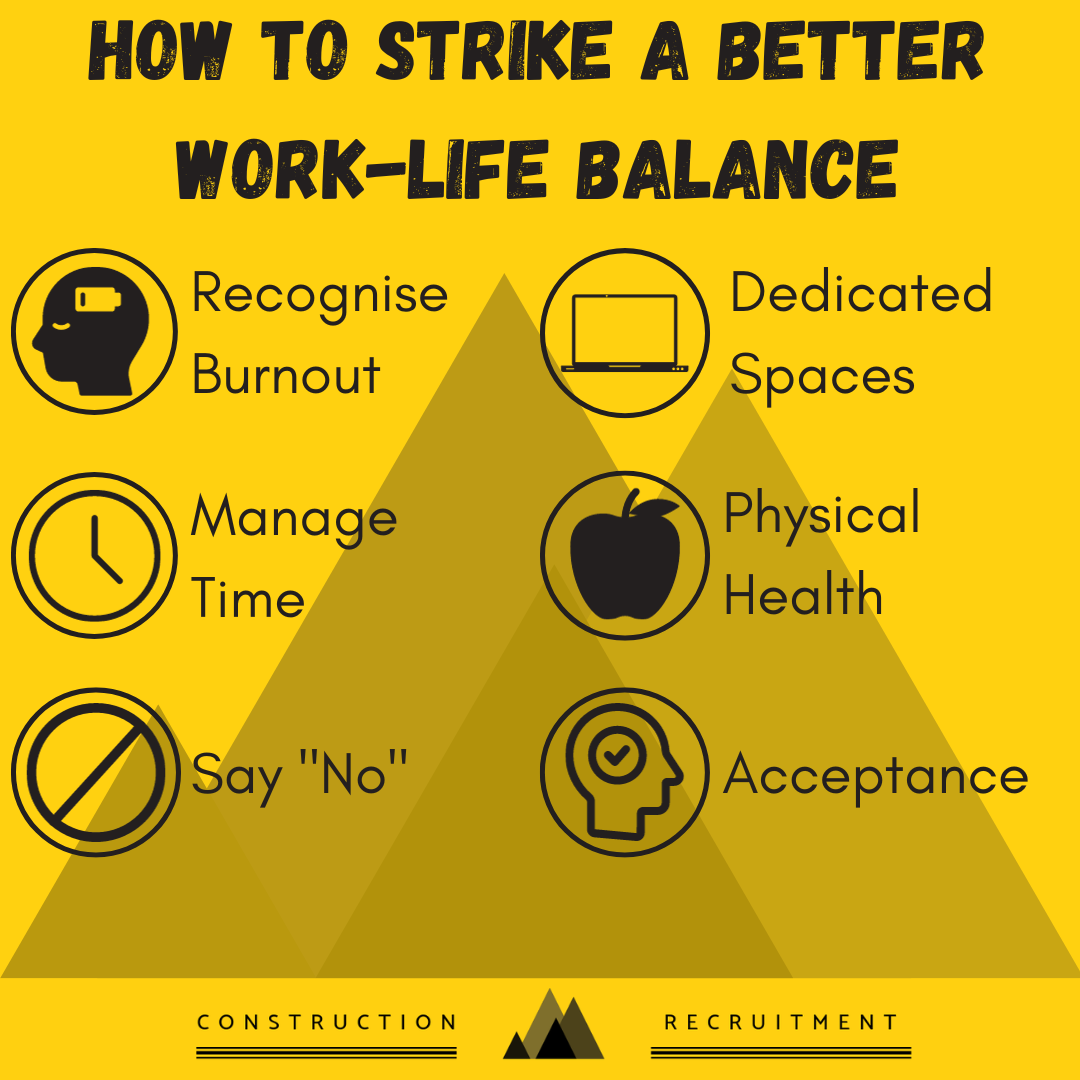
23 May How to Strike a Better Work-Life Balance
As home-working becomes more and more common and technology increasingly ties us to work, a work-life balance has never been more elusive.
Not striking this balance, however, can lead to mental and physical burnout and can put a strain on our relationships with family and friends.
So how can you maintain a work-life balance in the modern world of work?
- Recognise the symptoms of burnout
Learn to recognise the symptoms of mental and physical burnout. Remember, no job should cost your mental or physical health. If you feel continually anxious or stressed or see changes in your sleep, health or fitness, it might be a sign that you need to take action towards a better work-life balance. Check out our blog post “6 Signs it’s Time to Change Jobs: Do Any Apply to You?” for more signs of burnout.
2. Manage your time strictly
When you have access to platforms needed for work at home, it can be tempting to complete tasks at home, outside of working hours. Even if this is not the case, most of us are guilty of staying at work beyond contracted hours to try to get on top of our workload. Try to prioritise and schedule your tasks into your working hours so you can finish on time and leave work at work. If this isn’t possible, it could be that you need to speak to your line manager about your workload. For more tips on managing your workload, check out our blog post “The Biggest Stresses at Work and How to Combat them”.
3. Learn to say “no”
If last-minute tasks are dropped in your physical or metaphorical intray and don’t fit into your prioritised, carefully scheduled day, simply say “no”. Professional and polite ways to phrase this include:
- “Unfortunately, I have too much to do today and so won’t be able to complete this to the standard and in the time required. I can help you another time”
- Sorry, I have already committed to something else. I hope you understand.”
- Sadly, my schedule does not permit me to help with that. Can you keep me in mind for next time?”
4. Assign spaces for your professional and personal life (including digital spaces)
Working from home blurs the line between your professional and personal lives. As well as maintaining boundaries in your time management, it’s also important to uphold strict geographical boundaries as well. Try to set up your workspace away from leisure spaces in your home, for example, a study or a small corner of your living room. Ensure this is tidied away or the door is closed at the end of your working day. This will benefit both your professional and personal lives as you will be more focused at work and more relaxed in your leisure time.
This approach includes digital spaces. Try not to use your work phone or laptop outside of working hours.
5. Take care of your body
Always make time for your physical and mental health. Most importantly, this will make you healthier and happier but will also make you more effective at work. If your job is detracting from your physical or mental health, it may be time to contact your recruiter to look for other opportunities. See our blog post “6 Signs it’s Time to Change Jobs: Do Any Apply to You?” for signs your job is bad for your health.
6. Accept it will never be perfect
While it’s important to continue to strive for a better work-life balance, it’s equally important not to criticise yourself for not achieving perfection in this difficult task. Keep coming back to these 6 steps to achieve more balance between your professional and personal lives and if your job makes this impossible, remember your recruiter is always on hand to find better opportunities tailored to you.
YourConstruction offers an efficient, effective and enjoyable recruitment service. We operate with a fully digital recruitment model, integrating artificial intelligence and machine learning into our day to day running of the business to help us provide the most efficient recruitment service to you. You’re not just speaking to another recruiter, you’re dealing with exceptional headhunters who fully understand your requirements – whether that be personality traits, technical skills or industry-related knowledge.
Contact Information:



